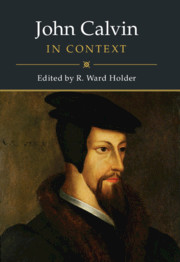Book contents
- John Calvin in Context
- John Calvin in Context
- Copyright page
- Dedication
- Contents
- Contributors
- Acknowledgments
- Abbreviations
- Introduction
- Part I France and Its Influence
- Part II Switzerland, Southern Germany, and Geneva
- 7 The Swiss Confederation in the Age of John Calvin
- 8 Strasbourg in the Sixteenth Century
- 9 Geneva and Its Protectors
- 10 Daily Life in Geneva
- 11 Reforming the City-State
- 12 Consistories and Discipline
- 13 Reformed Education and the Genevan Academy
- 14 Worship, Pastorate, and Diaconate in Early Modern Europe
- Part III Empire and Society
- Part IV The Religious Question
- Part V Calvin’s Influences
- Part VI Calvin’s Reception
- Conclusion
- Bibliography
- Index
- References
9 - Geneva and Its Protectors
from Part II - Switzerland, Southern Germany, and Geneva
Published online by Cambridge University Press: 14 November 2019
- John Calvin in Context
- John Calvin in Context
- Copyright page
- Dedication
- Contents
- Contributors
- Acknowledgments
- Abbreviations
- Introduction
- Part I France and Its Influence
- Part II Switzerland, Southern Germany, and Geneva
- 7 The Swiss Confederation in the Age of John Calvin
- 8 Strasbourg in the Sixteenth Century
- 9 Geneva and Its Protectors
- 10 Daily Life in Geneva
- 11 Reforming the City-State
- 12 Consistories and Discipline
- 13 Reformed Education and the Genevan Academy
- 14 Worship, Pastorate, and Diaconate in Early Modern Europe
- Part III Empire and Society
- Part IV The Religious Question
- Part V Calvin’s Influences
- Part VI Calvin’s Reception
- Conclusion
- Bibliography
- Index
- References
Summary
The mottled confessional map of Europe at any of the major junctures of the Reformation, say in 1555 or in 1648, hints at the complex tangle of political alliances, military campaigns, and dynastic aspirations that led to Catholic, Lutheran, and Reformed territorial holdings. Throughout the course of the Reformation, contingent political and military circumstances established the parameters of religious reform. In the early 1520s, for example, Charles V’s need for support among German princes against enemies foreign and domestic enabled Lutherans to gain traction in Saxony and Hesse. Decades later in the fall of 1588, storms in the North Atlantic blew ships in Spain’s Armada into the coastlines of Scotland and Ireland, helping preserve the Elizabethan settlement in England. And in 1620, the Count of Tilly’s imperial forces overran Bohemian troops at White Mountain, a victory that cleared the way for the recatholicization of Czech lands. Strokes of (mis)fortune at courts, on seaways, and on battlefields such as these carried unforeseen and far-reaching implications for the religious map of Europe in the sixteenth and seventeenth centuries. It makes sense, therefore, when considering John Calvin and Calvinism in their fullest contexts to reflect on the conditional political and military incidents that befell the Republic of Geneva in the Reformation period. Calvin’s leadership in propagating his brand of Reformed Protestantism with such vigor and success derived in no small part from the independence Geneva achieved among regional powers.
Keywords
- Type
- Chapter
- Information
- John Calvin in Context , pp. 79 - 86Publisher: Cambridge University PressPrint publication year: 2019

